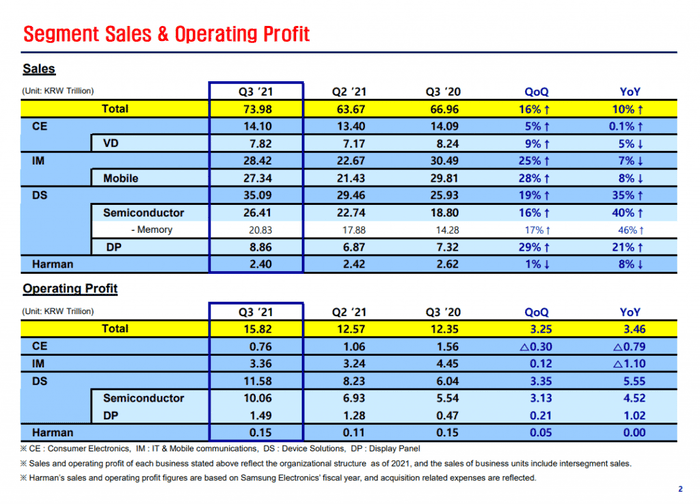Samsung delivers record quarter on the back of chip demandSamsung delivers record quarter on the back of chip demand
Samsung Electronics published its financial results of Q3 with highest ever revenue and second highest profit, driven by sustained high market demand for semiconductors.
October 29, 2021

Samsung Electronics published its financial results of Q3 with highest ever revenue and second highest profit, driven by sustained high market demand for semiconductors.
Samsung’s total revenue on corporate level grew by 10% year-on-year to reach a record high of KRW 73.98 trillion ($63 billion, $1 = KRW1,171.4). The 42% gross margin is slightly higher than last quarter and an improvement of 1.7 percentage point y-o-y. Operating profit reached KRW 15.82 trillion, the highest in three years and the second highest in history. Samsung stated that it was positively impacted by the weak Korean won, in the region of KRW 800 billion on operating profit compared with Q2 this year.
Samsung has benefited from the continuous high demand for semiconductors, especially memory products. The sales generated by the component business unit (which Samsung calls Device Solutions) went up by 35% to reach KRW 35.09 trillion, while the Semiconductor sub-unit increased its sales by 40% y-o-y and its operating margin grew by 81%. The Memory business, which contributed to 80% of Semiconductor sales, grew its business by 46%.
Samsung attributed the strong growth of memory chips business to favourable pricing sustained by demand from the server market and the company’s own success in reducing costs by expanding the portion of its cutting-edge processes.
The IT & Mobile Communications unit, which was the largest business unit until recently, registered a 25% sequential increase in revenue and a more modest 4% sequential increase in operating profit (both indices still fell short of the level of the same quarter last year). Samsung said the growth in sales was driven by the rebound in smartphone market, and its high-value foldable products have been doing well. But the unit’s profitability was impacted by increased marketing investment, especially in taking the foldable category to the mainstream market.
Samsung expects to see the global IT market recover in 2022. To capture the opportunity Samsung will invest to mass produce 14-nm DRAM and to mature the next-generation products based on extreme ultraviolet (EUV) technology. Samsung will continue to focus on the premium segment of the smartphone market as well as to strengthen the expansion of its mobile networks business. At the same time, as other companies have done, Samsung also warned that “uncertainties related to component supply disruptions and COVID-19 are likely to remain.”

About the Author
You May Also Like










.png?width=300&auto=webp&quality=80&disable=upscale)


_1.jpg?width=300&auto=webp&quality=80&disable=upscale)